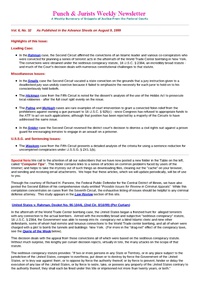Here the Court questioned whether the exhaustion requirement of 42 U.S.C. § 1997e(a) applies to deliberate indifference claims in the context of suits for monetary damages where an administrative appeal could not award such damages.
This case calls to mind the question once asked by the Roman scholar …
The defendants in this case were the survivying members of the Branch Davidian sect who were charged with and convicted for, among other things, violating 18 U.S.C. § 924(c)(1) based on their involvement in the events that occurred at the Mount Carmel compound near Waco, Texas, in early 1993. …
QUOTE OF THE WEEK - The drag-net effect of the conspiracy laws.
Judge Learned Hand once commented that: ". . . many prosecutors seek to sweep within the drag-net of conspiracy all those who have been associated in any degree whatever with the main offenders. That there are opportunities …
In this case, the Court held that, notwithstanding the apparent mandatory nature of U.S.S.G. § 5G1.2, a sentencing court may depart from the "stacking" provision of that section to impose concurrent sentences where the imposition of multiple stacked sentences based on similar conduct created "an aggravating or mitigating circumstance, …
This case deals with a frequently-litigated section of the Guidelines, namely U.S.S.G. § 2X1.1(b)(2), which provides for a three-level sentence reduction in a conspiracy case if the co-conspirators are arrested “well before” they have completed all the acts necessary for the successful completion of the substantive offense. Because determining …
This decision contains an excellent review of the competing judicial views on the constant struggle over the expanding use of the Hobbs Act (18 U.S.C. § 1951) to prosecute "local" crimes that were previously left to the States. In this case, the defendants were initially charged with a string …
Palma v. United States, 48 F.Supp.2d 481 (E.D.Pa. 1999) (Judge Katz)
McHugh v. Rubin, 49 F.Supp.2d 105 (E.D.N.Y. 1999) (Judge Platt)
Both of these cases are noted as rare examples of a Federal court actually granting relief from the Federal firearms disabilities that apply after a defendant has been …
This case is noted for its review of the standards that apply to the admission of "similar acts" evidence under Rule 404(b) and for its rejection of the Government's motion to exclude evidence under Rule 608(b) that a key witness had lied.
The Court noted that Rule 404(b) …
In a detailed analysis of the standards for determining what constitutes impermissible double counting, the Court held that separate enhancements for "otherwise using" a firearm and for physical restraint of victims were not improper.
This case contains one of the clearest analyses we have seen of the factors …
In this case the Second Circuit held that an instruction given to a deadlocked jury, which created a duty to persuade other jurors and did not contain cautionary language emphasizing the necessity of remaining firm in one's own conscientiously held beliefs, was coercive and deprived petitioner of a fair …
Palma v. United States, 48 F.Supp.2d 481 (E.D.Pa. 1999) (Judge Katz)
McHugh v. Rubin, 49 F.Supp.2d 105 (E.D.N.Y. 1999) (Judge Platt)
Both of these cases are noted as rare examples of a Federal court actually granting relief from the Federal firearms disabilities that apply after a defendant has been …
Citing its decision in U.S. v. Guardia, 135 F.3d 1326 (10th Cir. 1998), where the Court upheld Fed.R.Evid. 413(a), the Court held held that Rules 413(a) and 414(a) are identical, except that the former applies to the "offense of sexual assault", while the latter aplies to the "offense of …
The Government moved in limine to exclude any impeachment of a potential witness under Rule 608(b) based on prior conduct of that witness in failing to testify truthfully in a proceeding that took place some 10 to 15 years earlier. The Government argued that the evidence should not be …
The Court stated: "In reaching this conclusion, we are persuaded by the Fifth Circuit's recent decision in United States v. Jobe. See 101 F.3d 1046 (5th Cir. 1996). Stanley Jobe was found guilty of violating section 1014 because he was listed as a guarantor on a co-defendant's loan presentation …
Citing U.S. v. Jones, 102 F.3d 804, 809 (6th Cir. 1996), the Court stated: "We note that this court has yet to acknowledge that sentencing entrapment, even if proven, constitutes a valid basis for a downward departure." (Id., at 503, n. 14).
Here the Court affirmed the district …
This case deals with another Federal statute that is rapidly relegating the States to the role of observers in still another area of law enforcement: bank robberies. Under the Federal Bank Robbery statute, 18 U.S.C. § 2113(b), the Government is required to prove three things: (1) the defendant stole …
In the aftermath of the World Trade Center bombing case, the United States began a frenzied hunt for alleged terrorists with any connection to the actual bombers. Armed with the incredibly broad and subjective “seditious conspiracy” statute, 18 U.S.C. § 2384, the Government was able to sweep into its …
